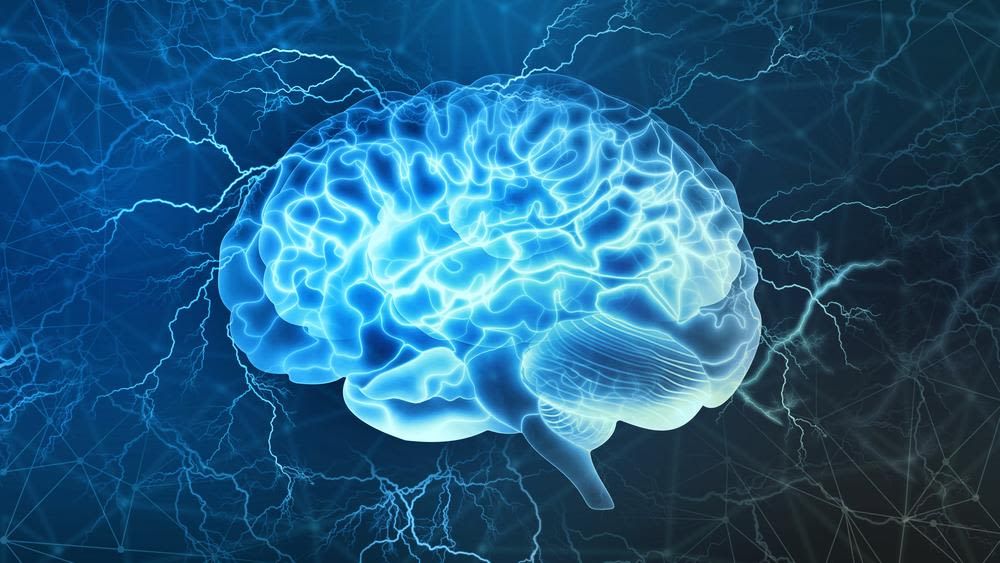
Research Assistant in Sleep and Stroke Rehabilitation at University of Oxford
Discover an exciting academic career path as a Research Assistant in Sleep and Stroke Rehabilitation at jobs.ac.uk. Don't miss out on this job opportunity - apply today!
📣 We're hiring! 📣
Research Assistant in Sleep and Stroke Rehabilitation
The Plasticity Lab are looking for a research assistant who will carry out studies investigating sleep, motor learning and recovery in healthy adults and people with brain injury.
Details and application:
shorturl.at/fgdm7
02.10.2025 14:27 — 👍 1 🔁 2 💬 0 📌 1
Assistant-e (A2) (6548)
We are hiring !
👩🏼🎓👨🎓🧑🏼🎓👨🏿🎓👩🏿🎓👩🎓
I am looking for a motivated person interested in a PhD in basic neuroscience, for a project at the edge between epilepsy and sleep.
If you are interested, check the job announcement:
jobs.unige.ch/www/wd_porta...
15.09.2025 12:41 — 👍 6 🔁 5 💬 1 📌 1
Incredibly excited to be a part of this!
27.06.2025 16:11 — 👍 2 🔁 1 💬 0 📌 0

We are looking to expand our fabulous physio team, with a permanent physio role in London (3-5 days) legs.org.uk/_files/ugd/15a… & freelance physio opportunities for in person classes in Islington & Croydon & online classes so you can work remotely ! #neurophysios #neurorehab #3rdsector
03.06.2025 14:04 — 👍 0 🔁 1 💬 0 📌 0
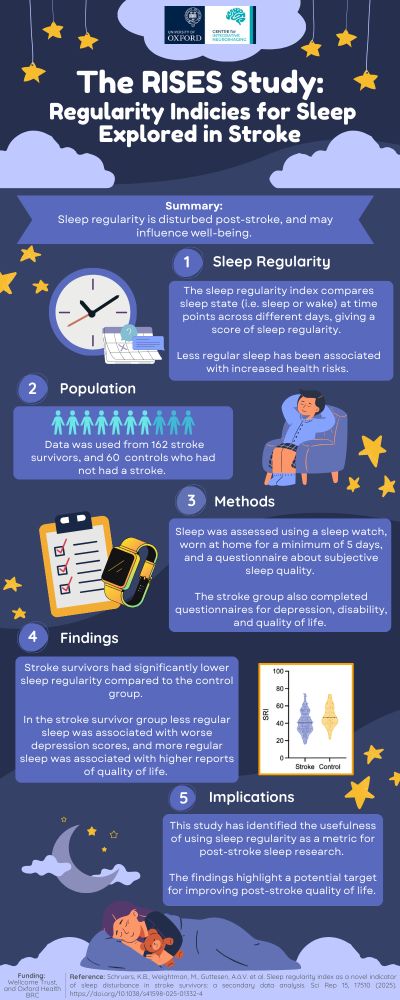
An infographic summarising the methods and findings of the RISES Study. Images of stars, the moon, and people sleeping with text as follows.
Summary: Sleep regularity is disturbed post-stroke, and may influence well-being. Sleep regularity: The sleep regularity index compares sleep state (i.e. sleep or wake) at time points across different days, giving a score of sleep regularity. Less regular sleep has been associated with increased health risks. Population: Data was used from 162 stroke survivors, and 60 controls who had not had a stroke. Methods: Sleep was assessed using a sleep watch, worn at home for a minimum of 5 days, and a questionnaire about subjective sleep quality. The stroke group also completed questionnaires for depression, disability, and quality of life. Findings: Stroke survivors had significantly lower sleep regularity compared to the control group. In the stroke survivor group less regular sleep was associated with worse depression scores, and more regular sleep was associated with higher reports of quality of life. Implications: This study has identified the usefulness of using sleep regularity as a metric for post-stroke sleep research. The findings highlight a potential target for improving post-stroke quality of life. Funding: Funding: Wellcome Trust, and Oxford Health BRC. Reference: Reference: Schruers, K.B., Weightman, M., Guttesen, A.á.V. et al. Sleep regularity index as a novel indicator of sleep disturbance in stroke survivors: a secondary data analysis. Sci Rep 15, 17510 (2025). https://doi.org/10.1038/s41598-025-01332-4
📣 New paper alert! 📣
🔎 The RISES Study looked at the sleep regularity index in stroke survivors compared to people who haven't had a stroke.
🔗 See a summary of our findings in our infographic below, and find the full paper here: rdcu.be/emZ09
@oxcin.bsky.social @ndcnoxford.bsky.social
21.05.2025 12:47 — 👍 7 🔁 4 💬 0 📌 0
Delighted to see this out. Massive Congratulations @katschruers.bsky.social !!
21.05.2025 15:34 — 👍 1 🔁 0 💬 1 📌 0
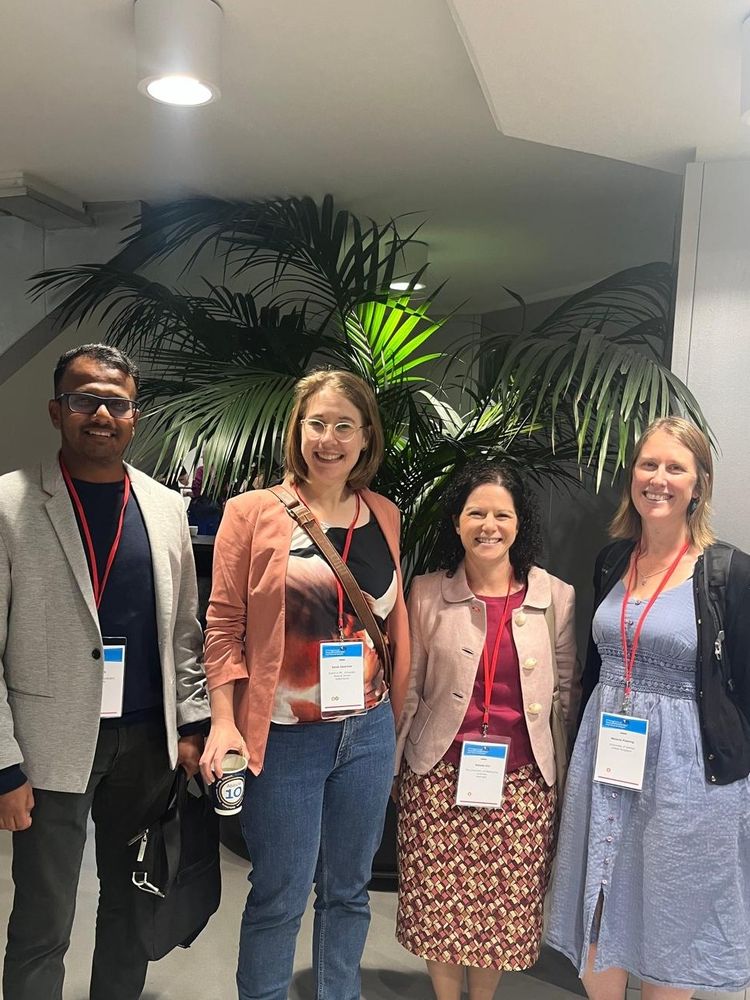
Wonderful to meet up with other members of the ISRRA emerging leaders group at the NNR conference in Maastricht . Great to learn more about your research. Fabulous presentation @natfiniphysio.bsky.social
16.05.2025 07:03 — 👍 1 🔁 0 💬 0 📌 0
🧠 It's Stroke Awareness Month! 🧠
Our group do a lot of research with stroke recovery - here you can watch two of our researchers discussing sleep after stroke at a Bristol After Stroke session.
@mattweightman26.bsky.social, @oxcin.bsky.social
15.05.2025 16:03 — 👍 2 🔁 1 💬 0 📌 0
I’m looking for a postdoc and RA for an ERC-funded project “SLEEPAWAY: Forgetting unwanted memories in sleep”. You’ll use MEG/EEG and fMRI to understand how the sleeping brain remembers and forgets. PLEASE REPOST 😊
Postdoc: tinyurl.com/vr5thp7s
RA: tinyurl.com/ycyzkatc
13.05.2025 11:21 — 👍 48 🔁 69 💬 0 📌 1

OxCIN logo
We're excited to announce that WIN is now the Oxford University Centre for Integrative Neuroimaging: OxCIN! Our mission: developing and deploying neuroimaging and related technology to solve big challenges in basic neuroscience and brain health. oxcin.ox.ac.uk/about/vision
28.04.2025 16:23 — 👍 43 🔁 14 💬 0 📌 2

Research Assistant/Lab Manager at University of Oxford
Looking for a new job opportunity in academia? Check out this job opening for a Research Assistant/Lab Manager on jobs.ac.uk!
We're excited to share that our lab is hiring for the position of Lab Manager/Research Assistant. A great opportunity to join our lab!
You can find full details and apply via the link below:
www.jobs.ac.uk/job/DMN515/r...
Please feel free to share this with anyone who might be interested!
07.04.2025 10:18 — 👍 3 🔁 7 💬 1 📌 1
Thanks for having me!
12.03.2025 18:55 — 👍 1 🔁 0 💬 0 📌 0
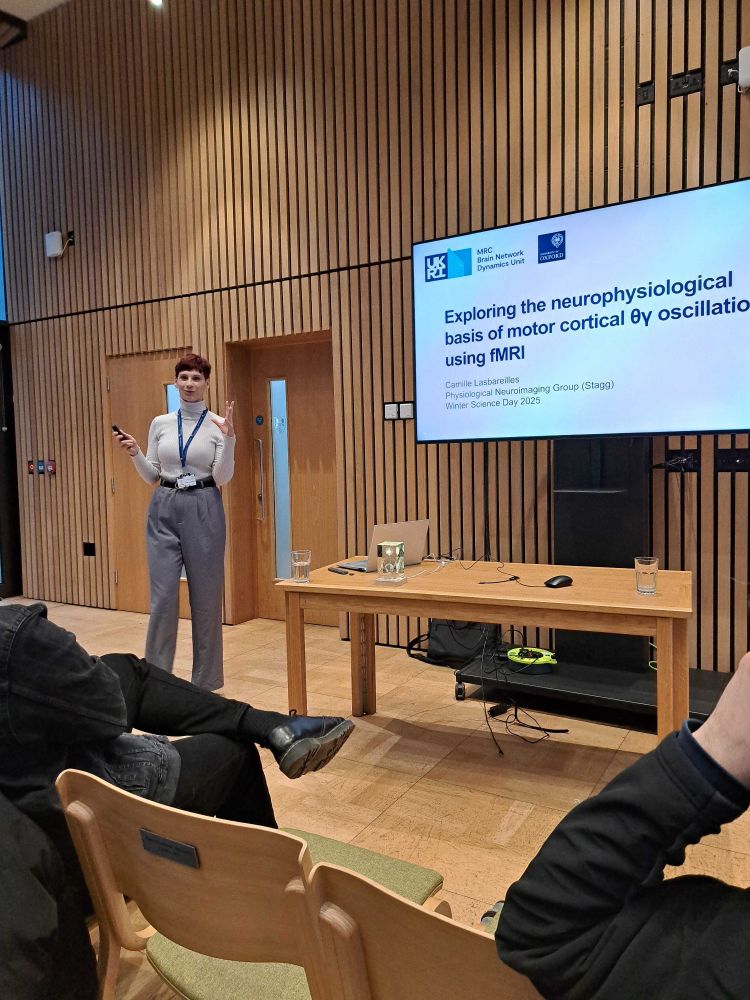
Woman presenting a PowerPoint presentation with animated hands. The slide is entitled "exploring the Neurophysiological basis of motor cortical theta-gamma oscillations using fMRI"
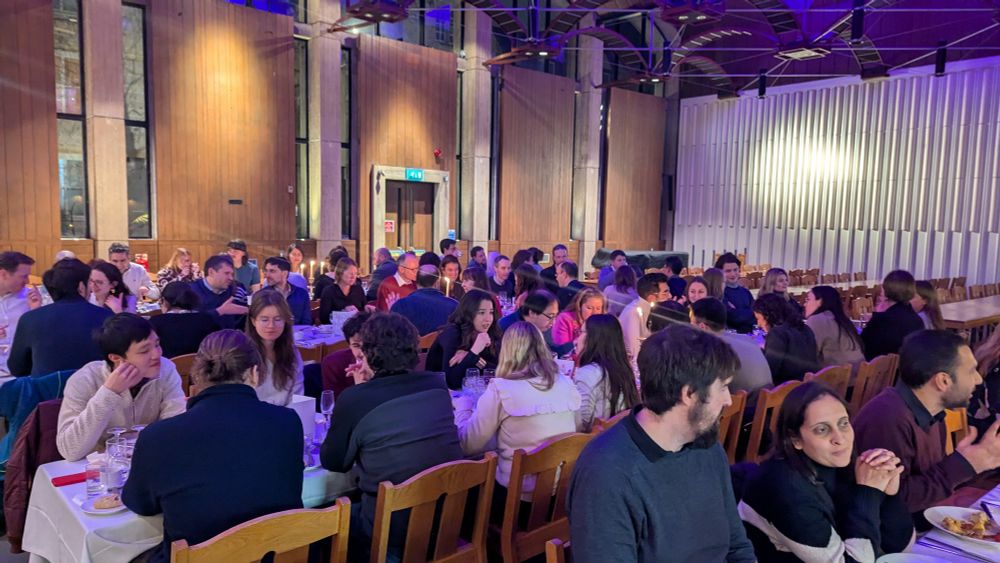
A large group of academics eating dinner together in an Oxford Hall.
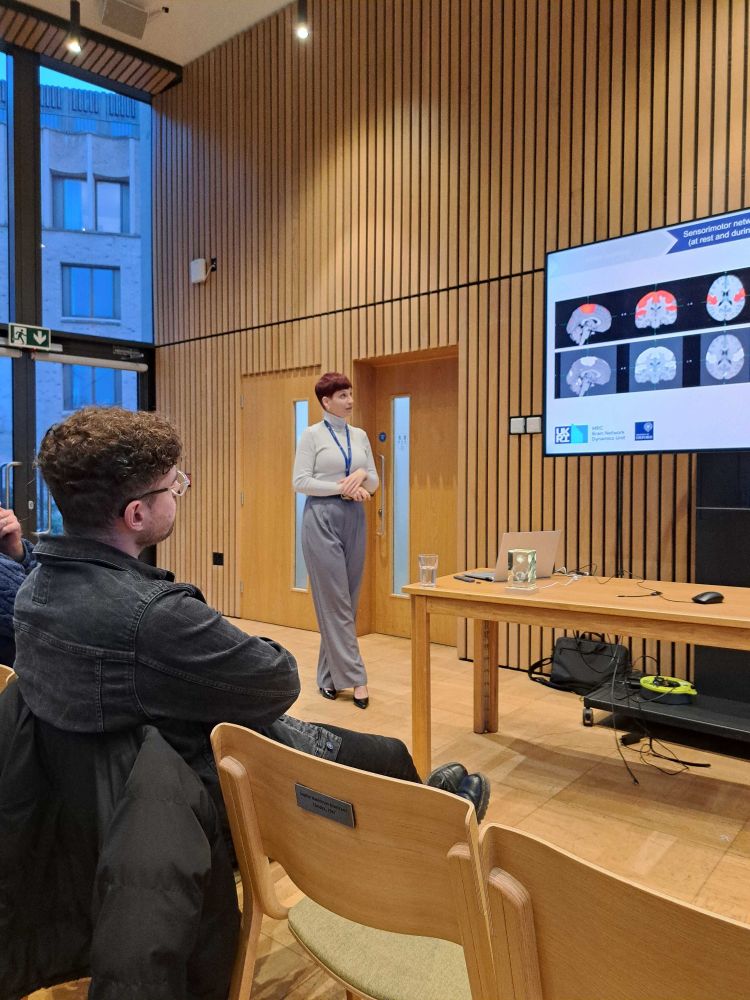
A woman presenting a PowerPoint slide with MRI brain images
Such a fun and wholesome @mrcbndu.ox.ac.uk Winter Science Day at St Hilda's College and @stedmundhall.bsky.social! Thank you for the opportunity to present my recent fMRI work 🧠🩵⚡
@ndcnoxford.bsky.social @neuroplastics.bsky.social @cjstagg.bsky.social
08.02.2025 22:05 — 👍 3 🔁 2 💬 0 📌 0
I'm excited to be a part of this programme! We'll be engaging with stakeholders, including people with lived experience of neurological conditions, to try to overcome barriers to future adoption of neurotechnologies. Can't wait to get started 🙂.
@ndcnoxford.bsky.social
20.01.2025 10:17 — 👍 3 🔁 2 💬 0 📌 0
Professor of Imaging Neuroscience at the University of Birmingham, co-Director of the Centre for Human Brain Health https://bsky.app/profile/thechbh.bsky.social
Professor of Cognitive Neuroscience
University of Oxford
https://www.staresinalab.com/
Assoc Prof, physiotherapist, passionate about rehabilitation that works & harnessing technology. www.advancingrehab.com
Cognitive neuroscience, Motor learning, Exercise neurophysiology. Monash University, Australia
Director of the Movement Neuroscience Lab at The University of Auckland and Editor-in-Chief of Experimental Brain Research.
Oxford Postodoctoral Researcher, Staresina Lab || Banting Postdoctoral Fellow || vision, memory, sleep, machine learning
PhD student in the Staresina Lab @University of Oxford
Interested in brain plasticity, translational research, neuro-imaging, sleep, learning and memory.
https://pinchunc.github.io
Postdoc at Oxford | PhD in Cognitive Sciences & MSc in Statistics from UC Irvine | Sleep & Memory
Sleep researcher, interested in the impact, assessment, and treatment of insomnia in oncological and neurological health conditions.
The British Sleep Society (BSS) is an professional organisation for medical, scientific and healthcare workers within sleep and sleep disorders
loves science, especially brain stimulation. bettina-schwab.net
Clinician-trialist. I do research with those who use it. Own views; RT≠endorsement. Stays up way too late.
@heartfoundation Fellow
Director of Edinburgh Clinical Trials Unit | NIHR Senior Investigator | innovative trials methods | robust development & evaluation of complex interventions | data science for trials
🧠 Consultant Physio Stroke Rehab, Royal Devon University Healthcare NHS Foundation Trust
📊 Researcher, University of Plymouth
🌍 East Devon, UK
👩🏼🦳 She/her. ADHD. Dyslexic.
#StrokeRehab
#BehaviouralScience #BehaviourChange
#ImpSci
#ClinicalAcademic
Rehabilitation Researcher and occupational therapist. Professor. Editor of Clinical Rehabilitation. Trustee Stroke Association and Elizabeth Casson Trust.
Consultant Physiotherapist, LNWUH & Hon. Associate Professor in Rehabilitation, KCL.
Specialist in neurorehabiltation, severe brain injury, stroke, spasticity and contracture management.
Professor, Biological Sciences; Director, Cognitive Motor Control Laboratory; Director, Center for Programs to Increase Engagement in the Sciences









